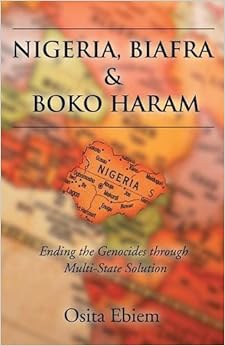(Review essay of Osita Ebiem, Nigeria, Biafra & Boko Haram:
Ending the Genocides through Multi-State Solution [New York: Page Publishing,
2014], 222 pp, US$12.84, pbk, US$10.00, kindle ed/£9.53, pbk, £5.99, kindle ed)
On this very day of 29 May 2014 that commemorates 48 years of Nigeria’s launch of the Igbo genocide, the foundational genocide of post-(European)conquest Africa, what more appropriate publication to read, and review, than Osita Ebiem’s excellent book, Nigeria, Biafra & Boko Haram: Ending the Genocides through Multi-State Solution.
Ebiem wastes no time, at all, to locate the source of this catastrophe,
human-made, lest we forget: Nigeria Nigeria
Ebiem’s discourse on the catastrophe that is Nigeria Nigeria
(George Russell Sextet, “Nardis” – personnel: Russell, piano; Don Ellis, trumpet; Dave Baker, trombone; Eric Dolphy, bass clarinet; Steve Swallow, bass; Joe Hunt, drums [recorded Riverside Records, New York, 8 May 1961])
The irony of the Nigeria
genocide-state is that its British conquest creators (human-made!) were aware,
right from the outset, of this impending catastrophe: chief conquest state operative
Frederick Lugard had intoned: “south and north [Nigeria ]
are like oil and water that do not mix” (Ebiem , Nigeria Kano
“[I]n the interest of the next ones”
If the catastrophe that is Nigeria
No generation of human beings should live as if the world comes to an end after them ... [T]he people in this generation must work at freeing all the entrapped sovereign nations and their people from the traumatic union of one Nigeria … this generation cannot afford to depart this stage without dissolving the Nigerian union in the interest of the next ones. (added emphasis) (184-185)
It is not often that one reads a book on such an incalculable
human-made catastrophe by an author of demanding honesty, some might say,
“insistent honesty”. Ebiem is calmly but emphatically telling all the
constituent peoples in the catastrophe that is Nigeria
On this 29th day of May, every Igbo woman and man
and every woman and man of goodwill across the world would do well to
order Ebiem’s Nigeria
Twitter @HerbertEkweEkwe
Twitter @HerbertEkweEkwe


No comments:
Post a Comment